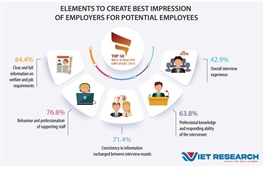Conference examines prospects for different investment channels in 2025
Conference examines prospects for different investment channels in 2025
Experts shed light on the factors shaping different investment channels in 2025, from real estate to stocks and cryptocurrency, at the second panel discussion at VIR's conference "Investing 2025: Decoding Variables - Embracing Opportunities" on December 12.
|
Speaking at VIR's conference, Nguyen Van Dinh, chairman of the Vietnam Association of Real Estate Brokers (VARS) said that real estate accounts for a large proportion of the economy, so it has a great impact. There are several factors affecting Vietnam's real estate market, including institutions, macroeconomics, planning and infrastructure systems, finance, the market, and information systems in the market. It is forecasted that the market will enter a new cycle in 2025.
"The Vietnamese government's management is more flexible, agile, and effective against the backdrop of difficulties in the global market. In terms of macroeconomics, in 2025, Vietnam is expected to maintain the achievements. In terms of institutions, we have greatly improved the quality of policies with a view to synchronise the entire content of the laws and provisions," Dinh said.
Le Duc Khanh, director of Analysis at VPS Securities, said that the VN-Index increased modestly at 12-12.7 per cent in 2023 and about 9-10 per cent in 2024. However, investors are not really satisfied with the fluctuations in the year because the VN-Index only increased in the early stages of the year. In the second and third quarters, growth slowed.
"However, December 2024 witnessed an explosion. The market has confirmed a bottom of about 1,200-1,240 points. Professional and experienced investors believe that the market will be on an upward trend from now until the end of the year. Hopefully, in 2025, the market outlook will become better with catalysts such as the improved GDP growth, import-export activities, and market upgrade story. We do not only expect a modest increase of 10-12 per cent but a rise of 15-20 per cent and even higher," Khanh said.
Nguyen Viet Duc, head of Digital Business at VPBank Securities, is upbeat about the prospect of 2025. To invest in stocks for the long term, he suggested investors look for leading companies with a return on equity over 15 per cent such as Hoa Phat, FPT, and VPBank.
"In the short term, we should consider policy factors because policy will determine whether stocks go up or down," Duc said. "First, Trump's policies will greatly affect the world, and Vietnam is not immune to this trend. In Vietnam, the government focuses on policies to promote public investment, energy to serve digital transformation, and streamlining the personnel apparatus. After the policies are in place, stocks will increase within 3 months to 6 months and 1 year."
Le Quang Hung, senior director of Investment Analysis at Techcom Capital, highlighted positive signals such as the recovery of the real estate market and the government's push for public investment. Still, there are many variables in the international market. In 2023, the Fed's move to lower interest rates was slower than expected, which had a great impact on the market.
"We should keep our eyes peeled for global variables during the investment management process. Although the current valuation is quite reasonable for long-term investment, we need to consider risk management. The investment asset class should include stocks and cover fixed income assets such as bonds, deposits, or sustainable credits. The stock investment channel is very attractive in 2025, but clients and investors should pay more attention to risk management by allocating their portfolios to different asset channels," Hung said.
According to Trinh Ha, a financial market analyst from Exness Investment Bank, young people today have easier access to new technologies and asset classes such as cryptocurrency. They have gained more knowledge about investing. Rather than investing in index funds, they have had clearer investment options in different asset classes such as stocks, bonds, gold, or currencies.
"In light of the recent fluctuations in the cryptocurrency market, young people are increasing their assets at a rapid rate. Most of their assets come from cryptocurrency ownership, with a proportion of about 35-36 per cent. This is coupled with stocks, especially technology stocks. With more support for cryptocurrency going forward, young people will increase their assets significantly," Ha said.
























